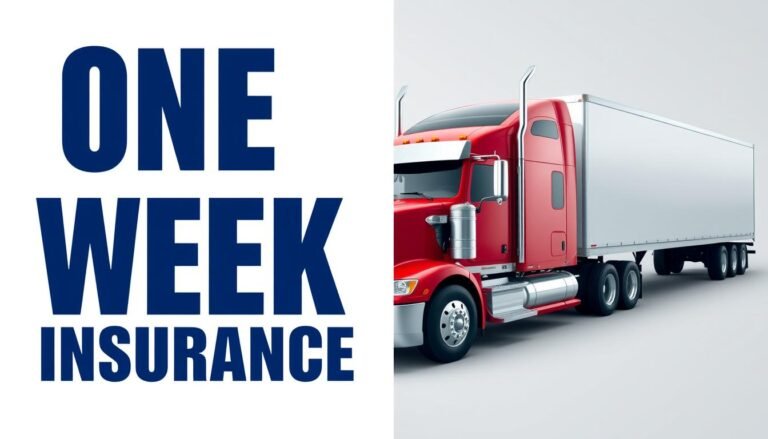Did you know 12% of commercial drivers in America need temporary vehicle coverage each year? Traditional policies often lock you into 30-day minimums, but specialized solutions now let you protect your rig for as little as $17 weekly. This flexibility reshapes how drivers manage seasonal jobs or short-term contracts.
Major providers like GEICO, Kemper, and Nationwide offer adaptable plans designed for haulers who don’t require year-round protection. These policies mirror standard auto insurance safeguards—liability, collision, cargo coverage—but without long-term commitments. Whether you’re transporting holiday goods or handling a single construction project, you pay only for the time you need.
Federal and state laws mandate proper commercial coverage, even for brief assignments. Short-term options ensure compliance while avoiding wasted expenses. Seasonal businesses, freelance operators, and occasional haulers benefit most from this approach, balancing legal requirements with budget-conscious planning.
Key Takeaways
- Affordable rates start at $17 weekly from top insurers
- Flexible plans adapt to seasonal work or single jobs
- Full coverage matches standard policy protections
- Meets federal and state commercial vehicle laws
- Ideal for temporary contracts or freelance drivers
Understanding One Week Truck Insurance
Why pay for annual plans when your hauling needs last days? Temporary solutions offer full safeguards without locking you into lengthy contracts. These plans mirror standard commercial protections while adapting to irregular schedules.

Defining Temporary Coverage in the Trucking Industry
Short-term commercial policies provide three core elements:
- Liability safeguards for third-party injuries or property damage
- Physical damage reimbursement for collisions or theft
- Custom periods from 1-30 days
| Coverage Type | Temporary Policy | Annual Policy |
|---|---|---|
| Liability Protection | Yes | Yes |
| Physical Damage | Optional add-on | Usually included |
| Average Weekly Cost | $17-$45 | $80-$150 |
When Flexible Plans Fit Best
Seasonal workers save 63% compared to annual premiums during off-months. Freelancers handling single contracts avoid paying for idle weeks. Other ideal situations include:
- Equipment relocation between terminals
- Trial runs for new clients
- Emergency backup for fleet shortages
State laws require commercial operators to maintain active protections regardless of workload duration. Temporary plans fulfill these mandates efficiently, letting you focus on revenue-generating tasks rather than paperwork.
Navigating Temporary Truck and Commercial Insurance Options
Finding the right coverage for brief projects doesn’t have to be complicated. Major providers now offer multiple pathways to secure protection that aligns with your timeline and budget. Let’s break down your choices.

Exploring Short-Term Insurance Alternatives
Consider these three strategies from leading companies:
- Buy-and-cancel method: Purchase a standard policy, then terminate after seven days. Providers like GEICO and Nationwide often waive cancellation fees for early termination.
- Non-owner policies: Ideal for contract drivers, these average $448 annually—12% cheaper than standard plans. They cover liability when operating vehicles you don’t own.
- Pay-per-mile programs: Save 15-25% if you drive fewer than 500 miles weekly. Sensors track usage, adjusting costs based on actual road time.
Evaluating Cost-Effective Protection for Your Truck
Rental vehicle plans work for single jobs, though they cost 18% more than traditional options. The trade-off? Deductibles often drop below $250, reducing out-of-pocket risks during short operational windows.
Key tip: Compare cancellation terms across companies. Some charge $50 processing fees, while others refund unused premiums. Urban locations and specialty vehicles typically increase rates—expect 22% higher costs in metro areas versus rural zones.
“Temporary policies let businesses scale protection with project demands, avoiding financial strain during slower months.”
Always verify coverage limits match state requirements. For example, Texas mandates $300,000 liability minimums for commercial haulers—even on one-day contracts.
Assessing Your Insurance Needs and State Requirements
Operating across state lines? Your coverage needs shift at every border. Forty-three states require higher liability coverage for commercial vehicles than personal autos. Missing these insurance requirements risks $5,000+ fines or operational shutdowns.
Meeting Minimum Liability and Regulatory Standards
Every location sets unique state requirements for commercial protection. California demands $15,000/bodily injury per person versus Texas’ $30,000 minimum. Federal rules add another layer—interstate haulers often need $750,000+ liability limits.
| State | Bodily Injury (Per Person) | Property Damage |
|---|---|---|
| California | $15,000 | $5,000 |
| Texas | $30,000 | $25,000 |
| Florida | $20,000 | $10,000 |
| New York | $25,000 | $10,000 |
Seven states mandate uninsured motorist coverage. Always verify both state and federal insurance requirements before accepting short-term contracts.
Flexible Cancellation Terms and Coverage Gaps
Thirty-day cancellation notices create challenges for true seven-day policies. Some providers charge $75 fees for early termination—others prorate refunds. Gaps in liability coverage trigger 22% average rate hikes at renewal.
Michigan requires 10-day advance notice for policy changes. Arizona allows immediate cancellations but holds drivers financially responsible for any property damage during uncovered periods. Maintain overlapping coverage when switching plans to avoid legal exposure.
“A single day without proper protection could bankrupt small operators facing major accidents.”
Step-by-Step Guide to Purchasing Your One Week Truck Insurance
Securing temporary commercial vehicle protection requires careful planning. Start by collecting your commercial driver’s license, VIN, and six months of prior policy records. Having payment details ready speeds up activation—most quotes process in under an hour.
Comparing Providers and Exploring Policy Options
Top carriers like GEICO offer seven-day plans starting at $9. Compare three key factors:
- Refund policies: 78% of companies prorate unused premiums
- Hidden fees: Watch for $25-$50 cancellation charges
- Coverage limits: Match your cargo type and route radius
Request simultaneous quotes through online portals or agent calls. Pro tip: Ask about multi-vehicle discounts if covering several rigs.
Proper Documentation and Cancellation Process
Always secure written confirmation when altering policies. Valid termination notices must include:
- Effective end date (time-stamped)
- Outstanding balance summary
- Refund timeline (typically 7-10 business days)
Overlap new and expiring coverage by 24 hours to prevent gaps. This safeguards against 18% premium hikes from lapses in protection.
“Digital records prove essential—screenshot every confirmation page and save email receipts.”
Insider Tips for Managing Temporary Coverage and Avoiding Pitfalls
Smart drivers know temporary vehicle protection requires vigilance. Nearly 1 in 5 commercial operators report encountering questionable offers when seeking short-term solutions. Protect yourself with these battle-tested methods.
Spotting Red Flags in Protection Offers
Fraudulent providers often use these tactics:
- Quotes 40-60% below market rates
- No physical address or license verification
- Pressure to pay via gift cards or cryptocurrency
| Legitimate Provider | Potential Scam |
|---|---|
| State-licensed with DOI verification | Vague regulatory compliance claims |
| Requires VIN and driving history | Asks for minimal documentation |
| Clear claims process timeline | Unreachable customer service |
Maintaining Continuous Protection
Bridge gaps between contracts with these strategies:
- Overlap policies by 48 hours during transitions
- Use non-owner coverage during equipment downtime
- Schedule cancellations after new policy start dates
Fines for lapsed protection range from $75 in Wyoming to $500 in New Jersey. Many states impose 30-day license suspensions for repeat offenses. Document all correspondence and confirm refund timelines in writing.
“Never let coverage expire before new protections activate—even 12 hours without valid policies risks financial ruin.”
Verify provider credentials through your state’s insurance department website. Legitimate companies display license numbers prominently and provide detailed policy documents within minutes of purchase.
Conclusion
Finding the right balance between flexibility and compliance remains crucial for short-term hauling needs. While traditional annual policies dominate the market, major providers like GEICO and Nationwide offer adaptable solutions through strategic cancellation terms. These arrangements let you secure essential protection without long-term financial commitments.
Maintaining continuous coverage proves vital. Gaps in safeguards risk steep fines or license suspensions across many states. Always verify state requirements and overlap policies during transitions to avoid legal exposure.
Seasonal operators and contract drivers benefit most from tailored solutions. Compare cancellation fees, refund terms, and coverage limits across multiple companies. Licensed professionals can help navigate complex regulations while avoiding questionable offers.
Proper documentation and thorough research form your best defense against scams. Digital records of policy changes and payment confirmations provide crucial evidence if disputes arise.
With careful planning, you can secure reliable protection that aligns with project timelines. This approach minimizes costs while keeping commercial vehicles legally operational during critical assignments.


